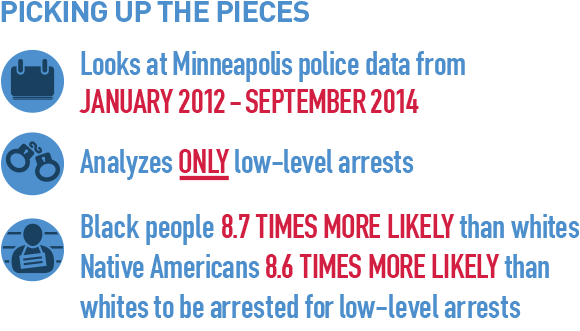
A recently released ACLU investigation a found that black residents of Minneapolis were 8.7 times more likely to be arrested for low-level offenses than white residents between January 2012 and September 2014. The report is the latest in eight city case studies, all of which “describe police departments that reserve their most aggressive enforcement for people of color.” The Minneapolis City Council also recently repealed spitting and lurking ordinances, two examples of the low level offenses cited by the report. Recent sociological research strikes a similar chord; it demonstrates how modern law enforcement isn’t just about crime, but controlling groups of people with minor rules and regulations.
Public discussion about crime tends to focus on felonies, but the majority of law enforcement activity today is geared toward misdemeanors. Even without conviction and sentencing, these minor offenses bring more people into the criminal justice system. The procedural hassle of dealing with a minor criminal record means more people are under this systematic control at any given time, regardless of their guilt or innocence.
- Issa Kohler-Hausmann. 2013. “Misdemeanor Justice: Control without Conviction.” American Journal of Sociology 119(2):351-393.
The ACLU report finds people experiencing homelessness are the most vulnerable to this system, and many are charged for minor offenses that directly result from being homeless (like panhandling or sleeping outside). Many cities criminalize these behaviors as a way to control space, even to the point that those with criminal records are barred from entering certain neighborhoods.
- Katherine Beckett and Steve Herbert. 2009. Banished: The New Social Control in Urban America. Oxford University Press.
This law enforcement isn’t just about crime, but also about power in communities of color. Neighborhood-level analysis shows that the stereotypical relationship between race and violent crime rates disappears for communities with more African Americans politically organizing and serving, either in office or on civilian review boards for the police. One of the ACLU’s recommendations to improve the situation in Minneapolis is to establish such review boards.
- María B. Vélez, Christopher J. Lyons, and Wayne A. Santoro. 2015. “The Political Context of the Percent Black-Neighborhood Violence Link: A Multilevel Analysis.” Social Problems 62(1):93–119.

Comments 2
Building a Military of Hackers and Makers - TIME — June 22, 2015
[…] 3. Misdemeanors are the secret weapon of America’s structural racism. […]
Who Gets a Ticket? – No Comment Diary — May 11, 2018
[…] justice system creates both large scale, dramatic disparities and little, everyday inequalities. Research shows that common misdemeanors are a big part of this, because fines and fees can pile up on people who […]